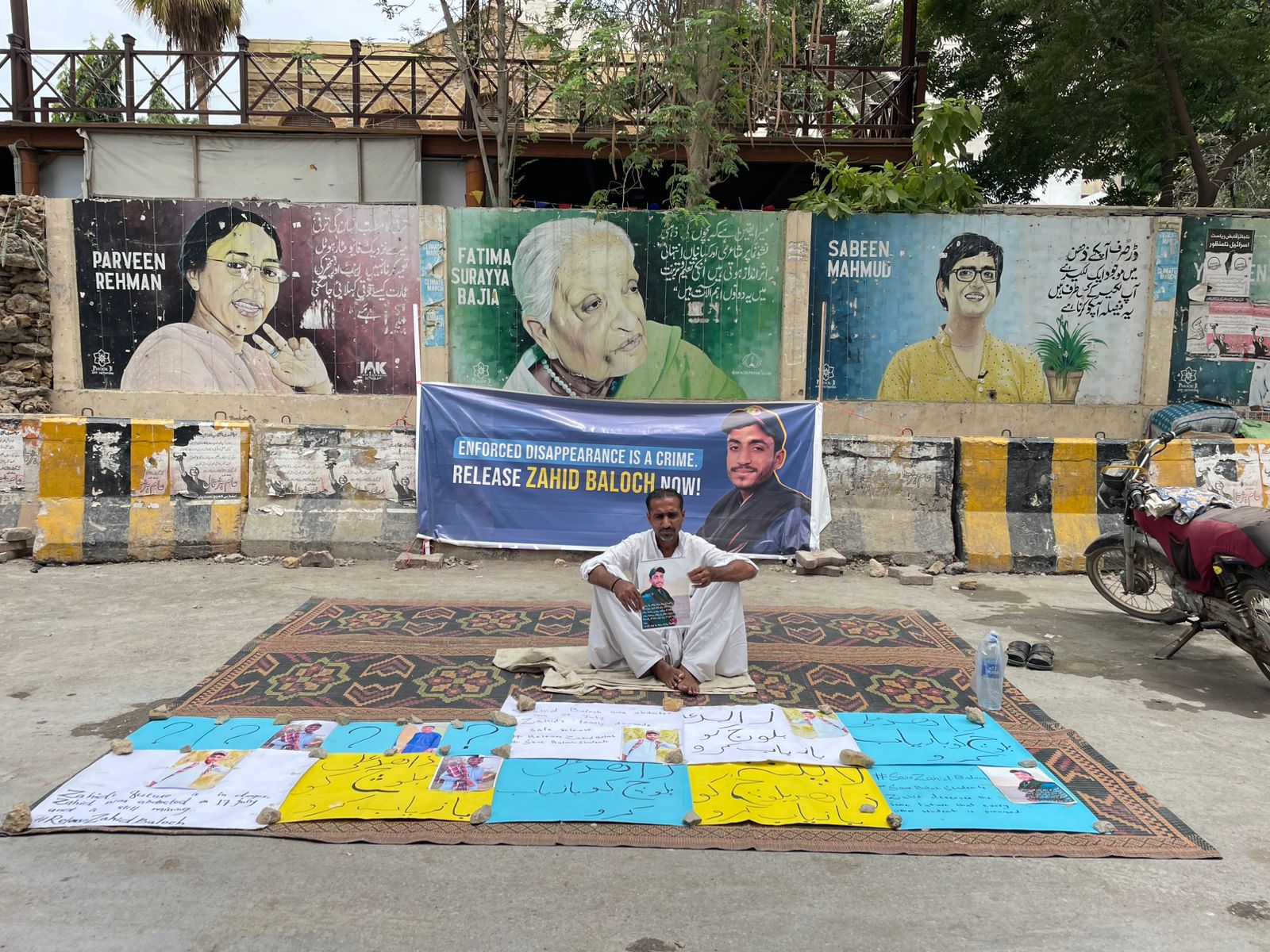In June 2022, during the third semester of my master’s at the University of Karachi, two of our fellow Baloch students were taken—enforcedly disappeared. The news spread like a wound across the Baloch students in the university. With their families, we set up a protest camp outside the press club. I kept posting updates on my Twitter feed, trying to make the absence visible. Days later, when we marched toward the Sindh Assembly, the protest turned brutal. There were arrests, baton charges, women dragged by their chadors, men beaten into the ground.
I still remember one scene with unbearable sharpness. A man lay on the road before me, a policeman striking him again and again. Two Baloch girls tried to shield him, but their hands were bloodied by the sticks. I hesitated, whether to run forward to help, or to lift my phone and film. I chose the latter. If I didn’t, I thought, the violence would vanish into silence. But the guilt has stayed with me: he writhed in pain while I pressed record.
As soon as I uploaded the video, a sudden blow hit my neck. A male officer had dragged me by the collar. I slipped the phone into my pocket just as the Lady SHO spat abuse “Is bhenchod ke liye alag van bulao… bhut mirchi hai isko video banane ki.” They threw me into a van. A female officer snatched my phone. Through the window of the police van, I saw the man still lying on the road. Then the van moved, and he disappeared from sight. That man was Babul.
We were released later that night. And later the very same night, the two disappeared students returned after eight days of disappearance.
I had often seen Babul at many protests I joined in Karachi, and I always thought his name was Babul. That was how he was known locally. Later, I came to know his actual name was Abdul Hameed. “Babul” was only a name of affection, given by his mother, and it spread until everyone called him that instead of Abdul Hameed. The day I learned this was another memory with him, three years later, in 2025, again a painful one. This time, it was his own son, Zahid, also a student at the University of Karachi. He was forcibly disappeared on 17 July 2025 from Lyari, Karachi, while driving his rickshaw, perhaps picking up a passenger. Zahid had just finished his final-year exams in the Department of International Relations. Now he was working the rickshaw. According to his father, Abdul Hameed, Zahid’s fees were still due at the university. They could not afford to pay them.
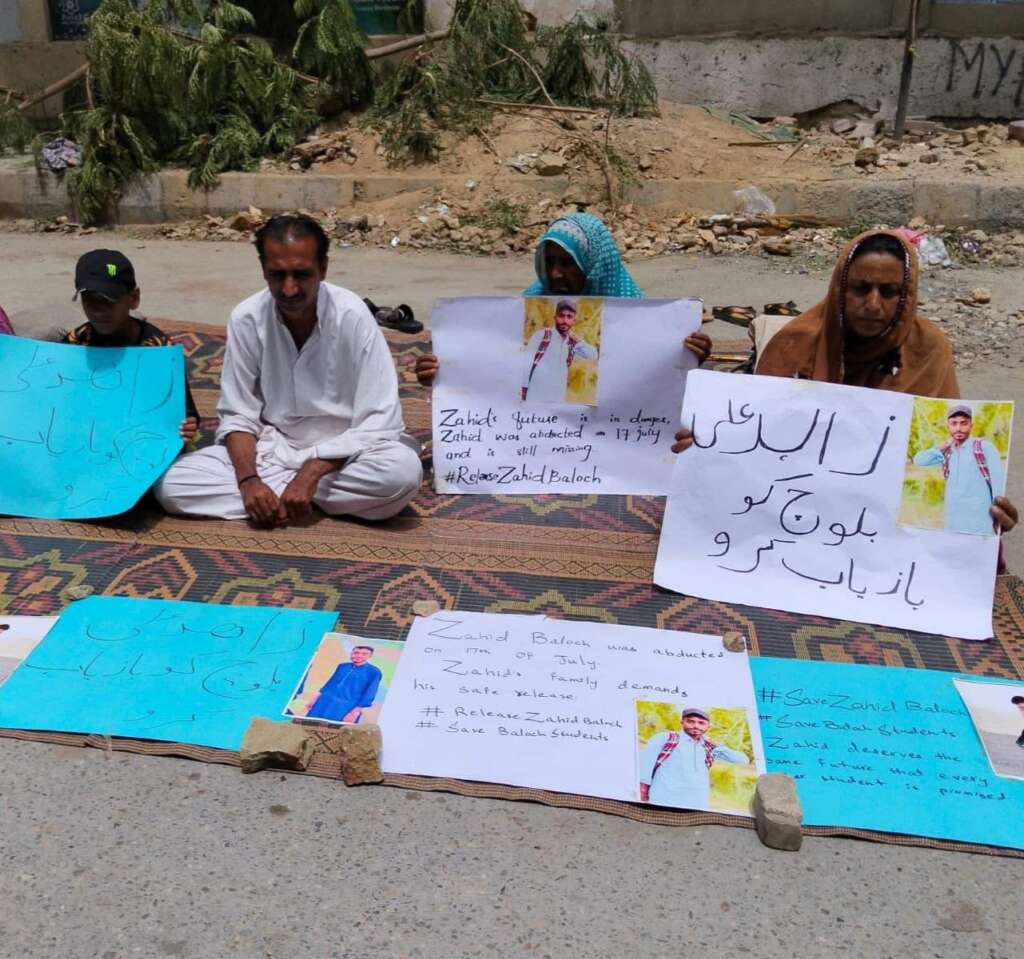
Abdul Hameed has been battling hepatitis D—delta virus since 2007. Over the years, the illness has worsened. He recalls that the day Zahid was enforcedly disappeared was also the day he had gone to see a doctor. Zahid had taken him to the hospital that morning, 17 July, and they returned home around 1 p.m. Later, Zahid left for his rickshaw rides.
Abdul Hameed said he was still in unbearable pain. Before 6 p.m., he called Zahid again, asking him to return and take him back to the hospital. Zahid answered. “Mana bortayy,” (They have taken me).
“Who?” his father asked.
“Intelligence agencies,” Zahid replied. The call was cut.
Abdul Hameed dialed again. This time Zahid told him not to call. In the background, he heard voices: Tell your father to remain silent, you will be released. Zahid repeated the words. The line went dead.
Abdul Hameed kept calling. Finally, the phone was switched off.
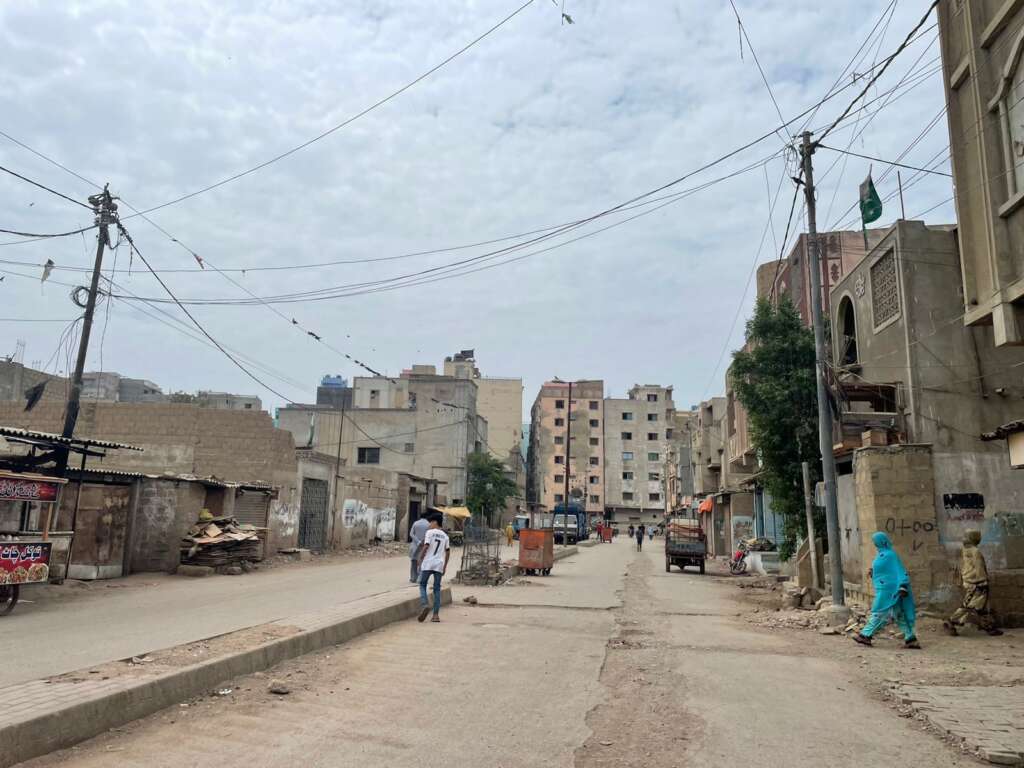
Abdul Hameed remained silent for three days. On the fourth, he decided to file a report for his son who had been forcibly disappeared. He first went to Kalari Police Station. They told him it was not their hudood—not their jurisdiction and directed him to the Baghdadi Police Station.
Babul went there. He was kept waiting for four hours. At the end, the officers told him: “Don’t you know the aaheen—the Constitution? We cannot file such reports.”
They refused to lodge the FIR. Babul left, and his health worsened. Soon after, he was admitted to Bantva Hospital in Kharadar. He was admitted there for seven days.
On 22 July, a press conference was held at the Karachi Press Club. Babul joined directly from the hospital. His body was frail. He sat in a wheelchair, a cannula fixed to his hand. Still, he spoke.
Afterwards, he was taken back to the hospital.
After being discharged from the hospital, Abdul Hameed filed a petition in the High Court of Karachi on 24 July. The court issued an order to the police station. Fifteen days after Zahid’s disappearance, Abdul Hameed finally received a call from the Baghdadi Police Station, asking him to come and file the FIR.
The FIR was lodged against na maloom afraad—unknown persons. Babul still remembers the harassment and humiliation that came with it.
The police first called both Abdul Hameed and his wife, Jan Bibi, since the petition was filed in her name. The officers began questioning him: What crime was your son involved in? He said he did not know of any. Who are his friends? Tell us their names. Again, he said he didn’t know. Tell us his university friends. He denied again. They insisted it was impossible he had no friends. They asked if he had worked in any organization. More questions followed.
There were three officers interrogating them. Suddenly, Abdul Hameed was told to step into the next room. His wife remained seated. As he entered, the door was locked behind him. The same questions followed, repeated again and again.
“I hesitated,” he said. “Zahid’s mother has never stepped outside, and now she was sitting alone before three male officers.”
He got up and opened the door. An officer behind him shouted: “This is not the way. Let us do our investigation.” Abdul Hameed ignored him and entered the room where his wife sat, sweating. “We are investigating her. You cannot interrupt” one of the officers said.
Abdul Hameed replied: “This is not an investigation. Instead of helping us find my son, you are criminalizing us—as if we have hidden him and come here.”
The FIR was not lodged until the court order. “Now we are leaving,” he told them. “We do not need the FIR.” Only then did the officers request them to stay. The FIR was finally filed against the unknown.
On 5 August 2025, Babul staged a sit-in camp in front of the Karachi Press Club. On the eleventh day of his protest—15 August, I visited around noon. Babul was there, alone. He comes every day. He would spread the carpet, arrange the charts, and hang the banner himself. With a piece of cloth, he would wipe the dust from the banner. On it, a picture of Zahid. In bold letters: “Enforced Disappearance is a Crime. Release Zahid Now.”
I had seen Babul at many protests before. His voice was always steady. That day, as I interviewed him, I felt him struggle with words. As if they were caught in his chest, breaking out only with deep breaths. The heat pressed down on us. The carpet beneath was burning. Sweat gathered, and the air turned heavy. His health, already worsened, faltered more under the weight of the afternoon.
At the camp for Zahid’s release, the entire family would often join—Zahid’s mother, his two younger brothers, and his grandmother. Zahid is the eldest son. His only sister had died of cancer in 2022.
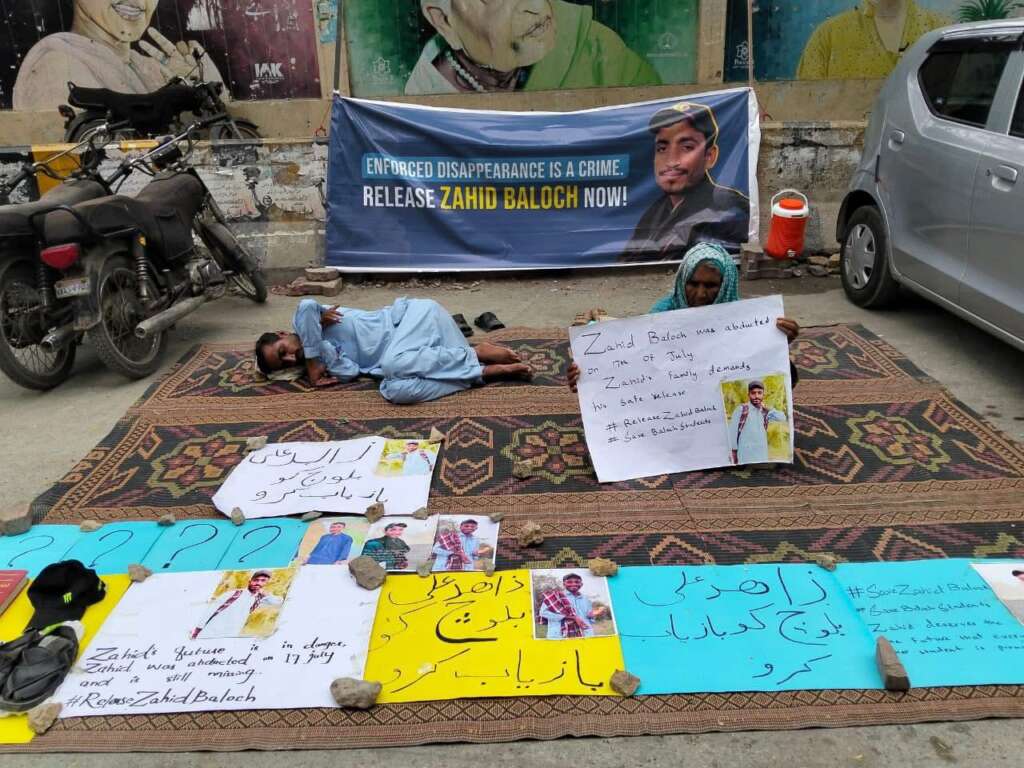
The day I visited, the other family members were not there. Babul explained why.
The previous day was 14 August—Pakistan’s Independence Day. The press club was crowded, full of noise. The presence of Sindh Rangers triggered his wife’s health. She is already battling ovarian cysts, and the pain of an elder son’s disappearance weighs heavily on her body. As the noise of baaja bajana grew louder and the Rangers stood nearby, she said she wanted to go to them, (Rangers) to ask about her son.
Every day since the sit-in began, she woke at 6 a.m. She cooked food, they would eat, and left for the camp, locking the house behind her. After the protest, she returned home, prepared another meal, and carried on with the day. That night, when she fell sick, a neighbor cooked for them instead.
On August 16, I revisited the camp to speak with Zahid’s mother. She was not there. Babul told me she had not recovered and was still sick. He was carrying the camp alone. The heat pressed down again, the floor too hot to sit on. He said he had just come from the hospital himself—that he, too, was unwell. The doctor had advised blood tests the next morning, before breakfast. I asked Babul about Zahid’s clothes and his chawat (sandal). I had seen them in earlier pictures of the camp, placed beside the banner, but now they were missing. He told me that since Zahid’s mother no longer comes to the camp, she does not allow him to keep them there, perhaps fearing that in her absence he would not care for them the way she does. Babul recalled a moment when a biker parked nearby and dust blew over Zahid’s clothes. His mother wept inconsolably. He told her not to cry, but it was then, he said, that he understood: a mother who cannot bear a trace of dust on her son’s clothes does not even know in what condition her son might be.
I then asked Babul if I could interview his wife at home. He gave me the address.
Abdul Hameed lives in Sar Gwaath, a neighborhood in Kalari, Lyari, Karachi, densely populated by Baloch families. In its narrow lanes, inside a dimly lit rented apartment, he shares two small rooms with his family. As you enter, the house is swallowed in darkness; there is no electricity. The landlord lives elsewhere, leaving the first floor locked. To reach Hameed’s home, you climb a narrow staircase with the help of a mobile torch. In the small courtyard, water drums, plastic canisters, and bottles are stacked in a corner, their presence a reminder of the struggle for water.
Jan Bibi, Zahid’s mother led me into her room. After greeting me, she handed me a glass of warm water. She was sweating, and so was I. “There is no electricity here,” she explained. She offered to go buy milk to make tea, but I told her I had just drunk some and had only come to see her. “God bless you,” she said.

The ceiling above her head was cracked. A rusted old fan hung limp. I wondered whether, even with electricity, it could move the air. I was not wrong, she told me that at night they sleep on the rooftop because the fan is useless. I asked about the water drums and bottles. “Here, water comes only for half an hour,” she explained. “And since we cannot afford a machine, the pressure is too weak. We fill whatever bottles we can for washing, cooking, bathing.” Most of the larger containers, she added, remain empty. From those few bottles, she carries water to the washroom. In the washroom and kitchen, there are no taps, no running water at all.
She was breathing heavily. I asked if she was alright. She told me there is a cyst—rasooli—in her ovary that leaves her in constant unease, but ever since Zahid was forcibly disappeared, she said, everything has only worsened.
“We live in misery, but that has never mattered to us,” she shared. “Here we have no electricity, no water, no refrigerator. In this narrow flat we suffocate, we drink warm water. I have health issues, Babul has, Babul’s mother too. That is part of our life—we have continued with it. But a child’s disappearance is not part of life. We cannot adjust to live with that.” Tears welled in her eyes. I struggled to console her.

She went on: “I cook food for the children, for Zahid’s grandmother. I see food and I cry more, it becomes like a wound in my throat. The thought of Zahid, if they have given him food or not kills me.” Her voice broke, her words circling back again and again—my throat, the wound, the food, Zahid. I could offer her nothing but my own helplessness.
She told me Zahid used to tutor children at our home, those weak in school, and he did it free of cost. When I asked if he still did this before his disappearance, she said he had stopped after taking up rickshaw driving—he no longer had the time. He had become the sole breadwinner of the household after his father, once also a rickshaw driver, was forced to stop due to his own failing health.
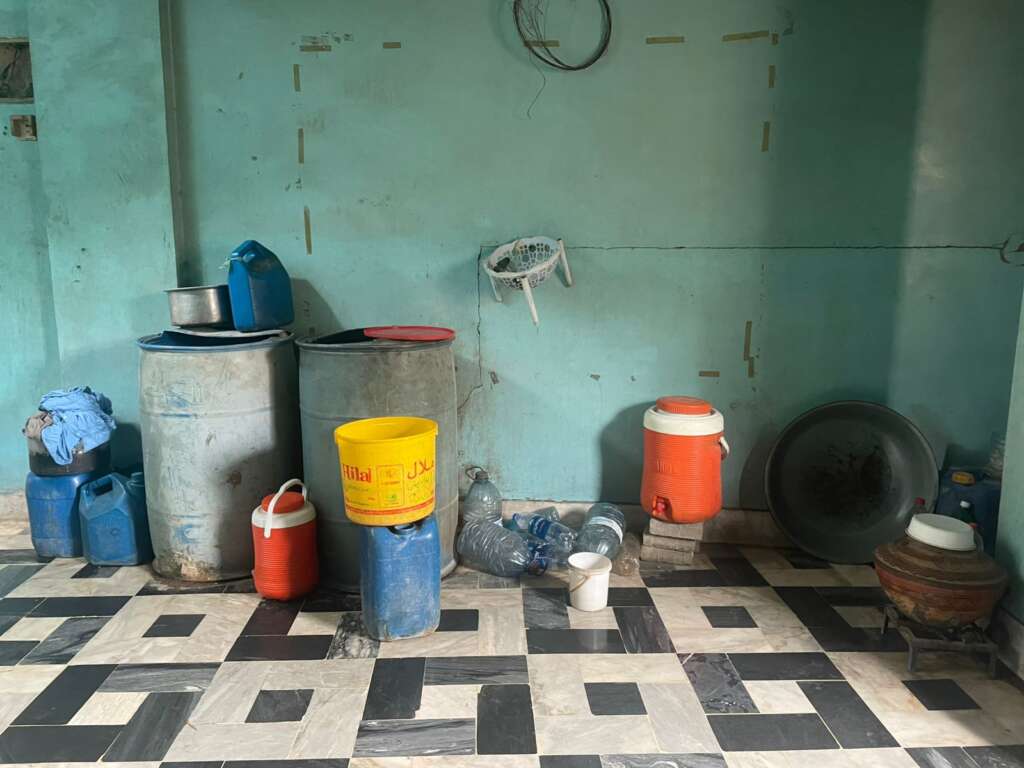
“At least they (Forces) should call us,” she said. “Tell us Zahid is with them, and that he has committed this crime. At least then we would know he is alive.”
In the next room, Babul’s mother sat quietly, whispering (Hazaar Allah)—a thousand repetitions of God’s name, a zikr prayer of the Zikri community. I sat with her, and she said softly: “In our house Zahid never broke a glass. How cruel they must be to take him.”
“I wanted to go back to the camp. There is no rest here,” she said. “But Zahid’s mother is unwell—I cannot leave her alone.” Grandmother, too, was frail. Her hands trembled as she spoke.
Abdul Hameed, 45, remembers the first time he joined a protest. It was 1998, on the call of the Baloch Students Organization, against the nuclear tests carried out in Chaghi. Since then, he says, he has rarely missed a protest for Baloch rights in Karachi.
He himself has been forcibly disappeared twice—once in 2016, and again in 2018. Both times, he was held for several days before being released. “For years, I fought for others,” he said. “Now I am fighting for my own son. That is a whole different pain. As a father, I can never explain it.” He fell silent, then managed a faint smile.
Babul said people around him live in fear. “Before, when I used to participate in protests, maybe I never noticed. But now, since it is my own protest, I see it. This whole press club is a disappointment.” He pointed to the press vans parked nearby, their cameras lingering in the air. “They don’t even look at me. They walk past, straight into the press club. I often call out, asking them to make a video of me. They act as if they have never heard, and they leave.”
“Some people visit me and say there is no use sitting here, that I should take care of my health, that Zahid will be released. How do I explain to them—I cannot abandon my son? A person like me, who has felt the pain of others, how can I remain calm when my own son is missing?”
His joints have weakened. At home, his wife told me how he returns from the camp writhing in pain, sometimes crying through the night. But the next morning, he gathers his strength and goes back.
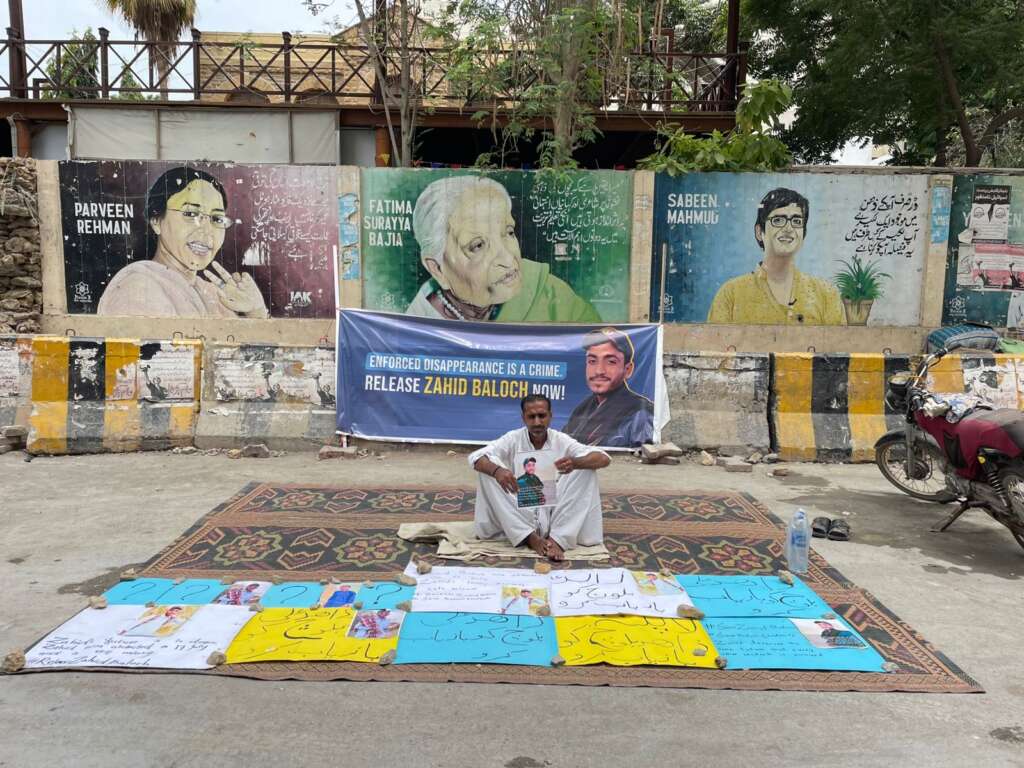
When I asked him about Zahid, his words faltered. “I cannot explain what Zahid is to me,” he said. He repeated his son’s name—Zahid, Zahid—as if searching for a way to speak it. Finally, he said: “Zahid, to me, is not just a son, but a dear friend. In his disappearance, I feel I have lost a dear friend.”
A motorbike roared past, its engine breaking the silence. Babul’s eyes welled with tears. He said nothing more and I kept my pen down.

